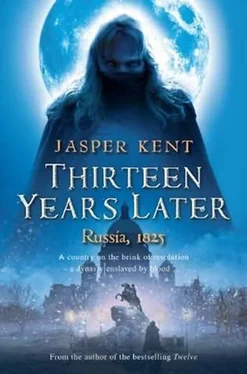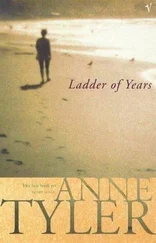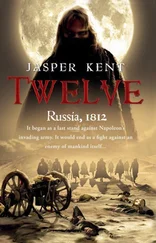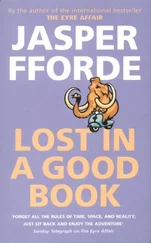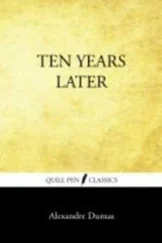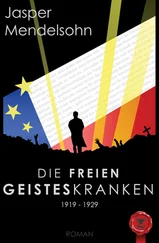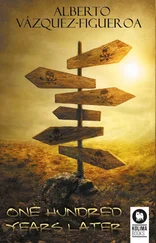He perceived the man’s jaw tighten as his lips came close, as if he were resisting the urge to recoil from some fetid stench. For the first time Aleksandr noticed a foul, metallic taste on his tongue, and wondered if it might not be his own breath that was so repellent. As he stepped away, he saw the man’s face in detail for the first time. He was a little younger than Aleksandr, in his early thirties, clean-shaven, with blue eyes and brown hair that extended in sideboards a little way down his cheeks. The jaw was square and solid. It was an unremarkable face, but one which Aleksandr would never forget.
He stepped back, releasing the man’s hand and again glancing at his own. It was now that he saw what Yekaterina had so long ago told him to beware: a ring, in the form of a dragon with a body of gold, emeralds for eyes and a red, forked tongue. Its tail entwined his middle finger. Aleksandr mouthed the name his grandmother had whispered to him, the name of the man through whose eyes Aleksandr was now seeing, just as his great-great-grandfather had once seen.
He reached out to touch the dragon ring, but as he did so, it vanished. His fingers were once again elegant and slender. He was in his palace.
Aleksandr understood what he had seen – or thought he did; a master sending away his servant. It would not be long before that servant came to Aleksandr. And so a servant did come, but when he did, his face had been nothing like the one Aleksandr had seen in his vision. He had been mistaken, but it made no difference. He had sent Cain away, and now he knew that he had done the right thing – the psalm told him so.
The metropolitan carried on reading, but Aleksandr no longer paid him any heed. Instead, he gazed at the floor of the chapel and made a silent promise to the Lord. What he had been, he would be no more. God would deliver him – would deliver Russia – and Aleksandr would make Russia into the country the Almighty wanted it to be. He would be delivered from the destruction that wasteth at noonday, and from the pestilence that walketh in darkness – the terror by night.
Within days, the good news arrived. Bonaparte and all his men – what was left of them – had abandoned Moscow and were heading west. The Russian army would deal with them, with the help of the Russian winter. And the Lord would ensure, Aleksandr felt certain, that the winter would be a bitter one. Far more than ten thousand would fall at his right hand. Aleksandr no longer had to fear the destruction. Now he could do God’s work.
And as for the pestilence, Aleksandr still feared that and awaited its advent, but it was not a threat that was to be faced by him, or by Russia, until thirteen years later.
‘IT MUST BE BY HIS DEATH.’
Ryleev spoke quietly, hiding neither his passion nor his distaste for his own words.
‘It’s not personal; it’s what he is, not who he is,’ he continued. He looked around the room, judging the reactions of the dozen or so men whom he was addressing, reactions with which he must already have been well familiar. ‘He’s the tsar.’ It was an unnecessary clarification, but it added to the enormity of what Ryleev was suggesting.
Some in the room nodded with hesitant acceptance. Some avoided his gaze. Others faced it, demonstrating by the fact they had the stomach to look their leader in the eye that they also had the stomach for his plan.
Aleksei Ivanovich Danilov was among those who allowed Ryleev’s eyes to fix on his. He revealed nothing – years of deceit had taught him how to make his eyes the barrier, not the window to his soul. In his time he had stared into eyes behind which there lay no soul whatsoever, and learned from that too. Ryleev’s gaze lingered momentarily longer on him, as though he were aware that he would detect nothing, but then moved on. Still no one commented on what he had said.
‘It’s changed him, being tsar – changed his nature,’ he continued.
‘It was the war that did that,’ said a voice from the back. ‘We all went to France and saw what liberty really meant. Aleksandr saw it too. Saw what it would mean for him. He was terrified by it.’
‘He should be terrified by it,’ said another.
‘He will be.’ This time Aleksei recognized the quiet voice as belonging to Pyotr Grigoryevich Kakhovsky. He had only recently returned to Petersburg, but had quickly become involved with the Society.
Not for the first time, Aleksei noted how much older he himself was than all the others gathered in the room. It was true they all remembered the fall of Paris in 1814, and most could recall Napoleon’s occupation of Moscow in 1812, but it would have been their first campaign. By 1812, Aleksei was already a toughened warrior.
‘But you raise the problem yourself, Kondraty Fyodorovich,’ he said, addressing Ryleev. ‘It’s not who he is; it’s what he is. We may kill Aleksandr, but the tsar will still live. The serfs will still serve. The censor will still censor. We won’t have a duma, we’ll just have Tsar Konstantin instead of Tsar Aleksandr – and for all his faults, I know which I’d prefer.’
Even as he spoke, Aleksei was glancing around his confederates in the comfortable, decadent salon and wondering which of Aleksandr’s failings it was that caused them most offence. They were not serfs themselves – nothing like it. Many had estates upon which hundreds of men were bound in labour. Nor were they aristocrats, for the most part, though there were princes amongst them. They were dressed either as gentlemen or as soldiers, and all sat on the elegant French chairs or leaned against the expensively papered walls with the air of men who fitted into society. What they shared was a simple conviction – almost a sense of embarrassment – that compared with the rest of Europe, Russia was still in the Dark Ages.
‘We’re lucky that Aleksandr has no children – only brothers to succeed him,’ said Kakhovsky. Aleksei shot him a questioning look. Kakhovsky smoothed his moustache in a way that hinted at a repressed anger. ‘I’d have less stomach to kill children,’ he explained.
‘Even the death of Grand Duke Konstantin may be unnecessary,’ interjected Ryleev. ‘If we can act quickly enough, we can take power – either with Konstantin as a puppet, or without him. And then we’ll free the serfs, and set up the duma, and publish whatever the hell we please.’
‘Why wait then, for God’s sake?’ exploded Kakhovsky. ‘The tsar’s had his chance. They all have. We have to act! You think Brutus sat around like this, discussing what would happen after Caesar’s death?’
Aleksei suspected that was precisely what Brutus had done, but didn’t mention it. It was a bad analogy anyway. ‘And did it do Brutus any good?’ he asked. ‘Who took power in the end? Augustus was Caesar’s nephew. Brutus helped to found a dynasty, not destroy one.’
‘And there lay Brutus’s error,’ said Ryleev, his manner calming the mood. ‘It is not “we” who will be doing the killing. Whoever carries out that task will be a garde perdue; a separate body able to take the blame for what has to be done and allowing those of us who envisage a new order to take power.’
‘Taking the blame,’ said Kakhovsky, his wrath now expressed as a growl rather than a roar, ‘but what about the punishment?’
‘To be forever devoured by Satan, like Brutus was?’ asked a voice. Aleksei smiled to himself; whatever the politics of this group, it was pleasant – and, in Russia, rare – to be amongst a group of men who would have no trouble understanding the reference to Dante.
Ryleev smiled too, but his expression was enigmatic. ‘Those who claim power will be magnanimous to those who brought about their rise to power. But in the eyes of the people, the two must be separate.’
Читать дальше
